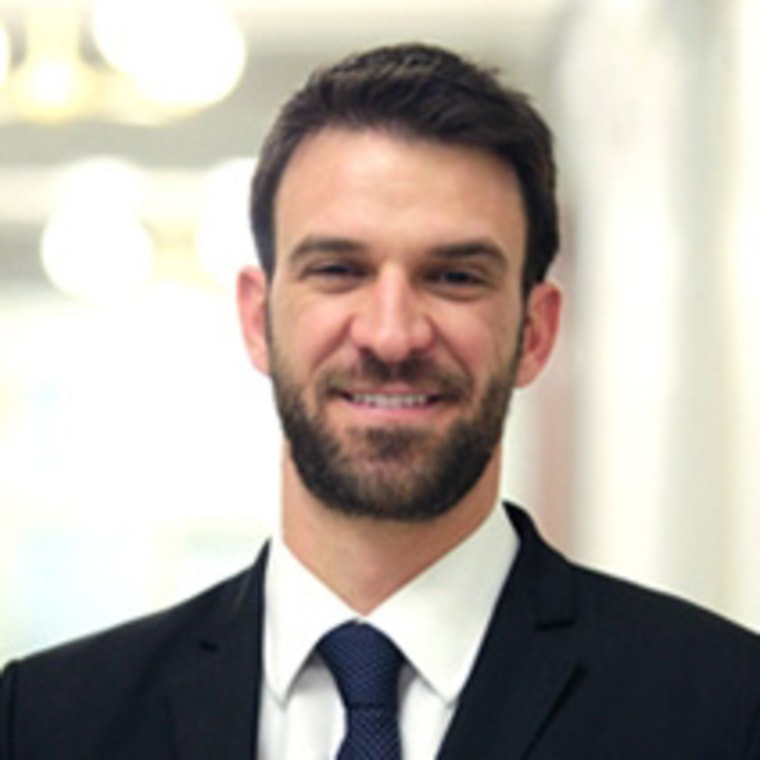MIAMI — The unexpected death March 2 of former Obama administration official Patrick Hidalgo, who was 41, shocked family and friends and reverberated nationally among those who knew Hidalgo, a longtime Cuban American Democratic political organizer.
Over seven months later, Hidalgo's family says they have answers to what they suspected — that the otherwise healthy Hidalgo did not die of hypertensive heart disease, as the Florida autopsy report stated — but that his lungs showed damage associated with Covid-19.

The family is slamming Florida's health authorities for refusing to test Hidalgo's remains for the coronavirus despite their multiple requests. Instead, the family said they arranged for an out-of-state autopsy consultation at Columbia University in New York, where pathologists said the kind of lung damage Hidalgo showed was "suggestive of, and consistent with early lung involvement of Sars-Cov-2," the virus that causes Covid-19.
Hidalgo's brother, Manny Hidalgo, released the Columbia University report in a letter in which the family said they are requesting "truthful answers" from the county about the refusal by the Medical Examiner's Office to test Hidalgo for the coronavirus, as well as "evasiveness that led to additional suffering inflicted on our family."
"By not telling us the truth that the autopsy revealed an obvious lung injury, Miami-Dade exacerbated our family's hardship," Hidalgo said in the letter.
Full coverage of the coronavirus outbreak
In a Facebook post Sunday, Hidalgo wrote: "The only reason Miami wouldn't test for Covid-19 is because of political pressure from FL's incompetent governor who has been complicit in Trump's campaign to obfuscate the effects of this virus from the moment he was informed of its existence."
Florida first announced two cases of the coronavirus on March 1, the day before Patrick Hidalgo died. But while Gov. Ron DeSantis was saying in mid-March that there was no sign of community spread, a report by The Miami Herald found that by mid-February, "top Florida health officials were scrambling to come up with a plan for a crisis they knew was upon them," monitoring hundreds of people, "far more than anyone outside state government knew at the time."
In a phone interview, Manny Hidalgo said that DeSantis' actions followed the lead of Trump administration officials, who "were trying to downplay the effects of this virus from day one," and that President Donald Trump "has done everything to obstruct, to obfuscate, to downplay, to cover up, to make it a nonissue, when it's clearly the issue."
Fred Piccolo, director of communications for Gov. DeSantis' office, said in an emailed statement to NBC News: “At no time was political pressure brought to bear on the Medical Examiner or anyone else in this case." Piccolo said that medical examiners' offices are paid by the counties. "We collectively grieve every Floridian who lost his or her life for whatever reason. And the Governor understands that all people grieve differently. But the accusations made by the family of Mr. Hidalgo are unequivocally false.”
The Miami-Dade Medical Examiner's office stands by their conclusion and in a statement to NBC News on Tuesday they said, "during autopsy, we fully inspected Mr. Hildalgo’s whole body. We also took tissue samples from the heart and lungs and inspected them under a microscope. Weighing evidence from all aspects of our examination, we determined that Hypertensive Heart Disease was his cause of death."
Patrick Hidalgo, a cousin of Miami Mayor Francis Suarez, was Barack Obama's Hispanic vote director in Florida during the 2008 presidential election. He went on to work at the State Department and later as director of business engagement at the White House.
He also served as an adviser during the Obama administration's historic opening of relations with Cuba, the country his parents fled in the early 1960s. Hidalgo had been working with the Miami Freedom Project, a progressive organization he co-founded to create a space for Miamians to voice progressive values.
Ana Sofía Peláez, who founded the organization with Hidalgo, said she is "still trying to understand how his death was even possible. It could have been prevented, like so many others. This makes it all the more painful,” she said. She recalled Hidalgo as a person who led with "incredible amounts of empathy and joy."
Manny Hidalgo said his brother told him on March 1, the day before he died, that he had awakened gasping for air and didn't feel well. Because it was right before Super Tuesday, the brothers discussed whether it could be stress-related. Manny Hidalgo told his brother to meditate and walk on the beach. The next day, Patrick Hidalgo was dead.
Nancy Santiago Negrón, a fellow former Obama administration official, said Hidalgo's cause of death "rattled me at my core."
Santiago Negrón lost a brother in 2009 at age 29 to the H1N1 virus. "Back then, we knew very little about the potentially fatal virus and how to prevent its spread," said Santiago Negrón, a co-founder of the PowerUp Fund, created to give grants to Latino-owned businesses during Covid. "But it is 2020. We know better. And this administration knew about the dangers back in January."
She said she believes Hidalgo would still be around "had the administration been transparent, had they shared this information when they knew."
"There is no doubt in my mind that Patrick would have taken the necessary precautions to protect himself and others," she said.
Manny Hidalgo said that while the answers to what Hidalgo died from bring some closure, they also raise more troubling questions.
"It makes me concerned as to how many other people have died from Covid-19 that we don't know about. The 225,000 figure is probably an undercount by a lot," he said. "I wonder if maybe what we know about Covid and its impact is just the tip of the iceberg."
Follow NBC Latino on Facebook, Twitter and Instagram.

